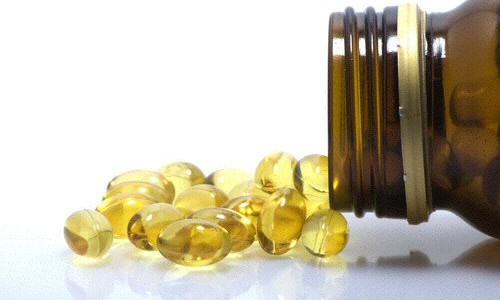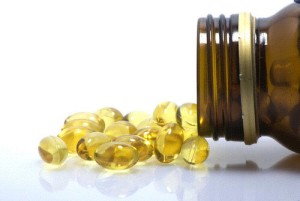Vitamin D deficiency is very common in America. In fact, there are roughly 3 million cases per year in the United States alone (1). Contrary to popular belief, vitamin D actually isn’t a vitamin, in the traditional sense. It’s a steroid hormone.
There are two main forms, D3 and D2. D3 is found in foods like fish and eggs, and it’s also produced in the skin by sunlight. D2, on the other hand, is found mostly in fungi. Studies have been done on both, and it’s been found D3 is actually the more effective and active form of the two for raising vitamin D levels in the blood (2,3).
Vitamin D is a fat soluble vitamin, which means it can be dissolved by fat. Once it’s active, it’s moved into the blood stream where it binds with receptors on our cells. From here, its used in various tasks like immune function and calcium absorption in our bones (4,5).
There are many health problems associated with deficiency (6). These can include:
- Osteoporosis
- Kidney Disease
- Diabetes
- Lung Disorders
- Weight gain
- Hypertension
- Cardiovascular disease
- Stroke
- Cancer
- Infection
Fortunately, you can increase your vitamin D through simple sun exposure or by taking a supplement. You can achieve this by being in the sun for about 15-20 minutes several times per week or taking a 4,000 IU/day supplement (7).
There are numerous health benefits of vitamin D. Studies have shown it can reduce depression symptoms, prevent osteoporosis, and may prevent cancer (8,9,10). However, one of the most surprising benefits is vitamin D can help you lose body fat. There have been many great studies that have come out to support this claim.
One study had two groups supplement with vitamin D or a placebo for 12 weeks. At the end of the study, they found that supplementation with vitamin D caused a statistically significant drop in body fat mass (11).
Another study found that vitamin d supplementation can improve testosterone in men. The researchers had the group supplement with vitamin D for one year. At the end of the study, the men had a 20% increase in testosterone levels and lost an average of 13 lbs (12).
Another study by the University of Minnesota, had individuals decrease their daily caloric intake to determine its affect on weight loss. They found that individuals with higher levels of vitamin D, at the start of the study, lost greater levels of abdominal fat (13).
So, how does vitamin D aid in fat loss? Well, when you have enough of this vitamin in your blood stream, your fat cells will decrease their efforts to make and store more fat. You also secrete more leptin when you have sufficient levels of vitamin D. This is one of our primary hunger hormones that gives us the signal of fullness so we eat less.
This little vitamin is very important, not only for the way we look but our health as well. Vitamin D deficiency is extremely common in the United States, and is associated with several health issues.
By taking a supplement or getting ample sun exposure, you can drastically decrease your risk of many diseases, improve your immune function, and lose body fat. It makes the choice a no brainer. Be sure your getting enough vitamin D!
References:
- Mayo Clinic
- Logan. V.F., et al. Long-term vitamin D3 supplementation is more effective than vitamin D2 in maintaining serum 25-hydroxyvitamin D status over the winter months. Br J Nutr 2013, 109:1082-1088.
- Lehmann, U. et al. Bioavailability of vitamin D(2) and D(3) in healthy volunteers, a randomized placebo-controlled trial. J Clin Endocrinol Metab 2013, 98:4339-4345.
- Hewison, M. An update on vitamin D and human immunity. Clin Endocrinol (Oxf). 2012 Mar;76(3):315-25.
- DeLuca, H.F., The control of calcium and phosphorus metabolism by the vitamin D endocrine system. Ann N Y Acad Sci. 1980;355:1-17.
- http://www.mayoclinic.org/drugs-supplements/vitamin-d/evidence/hrb-20060400
- Institute of Medicine
-
Penckofer, S. et al. Vitamin D and depression: where is all the sunshine? Issues Ment Health Nurs. 2010 Jun; 31(6): 385–393.
-
Garland, C.F., et al. The role of vitamin D in cancer prevention. Am J Public Health. 2006 February; 96(2): 252–261.
-
Sunyecz J. A., The use of calcium and vitamin D in the management of osteoporosis. Ther Clin Risk Manag. 2008 Aug; 4(4): 827–836.
- Salehpour, A. et al. A 12-week double-blind randomized clinical trial of vitamin D3 supplementation on body fat mass in healthy overweight and obese women. Nutr J. 2012. 11, 78.
- Pilz, S. et al. Effect of vitamin d supplementation on testosterone levels in men. Horm Metab Res. 2011. 43, 223-225.
- The Endocrine Society. “Successful Weight Loss With Dieting Is Linked To Vitamin D Levels.” ScienceDaily. ScienceDaily, 12 June 2009.
Photo Credit:
- http://www.harvestmarketnaturalfoods.com/top-5-supplements-everyone-should-consider/







